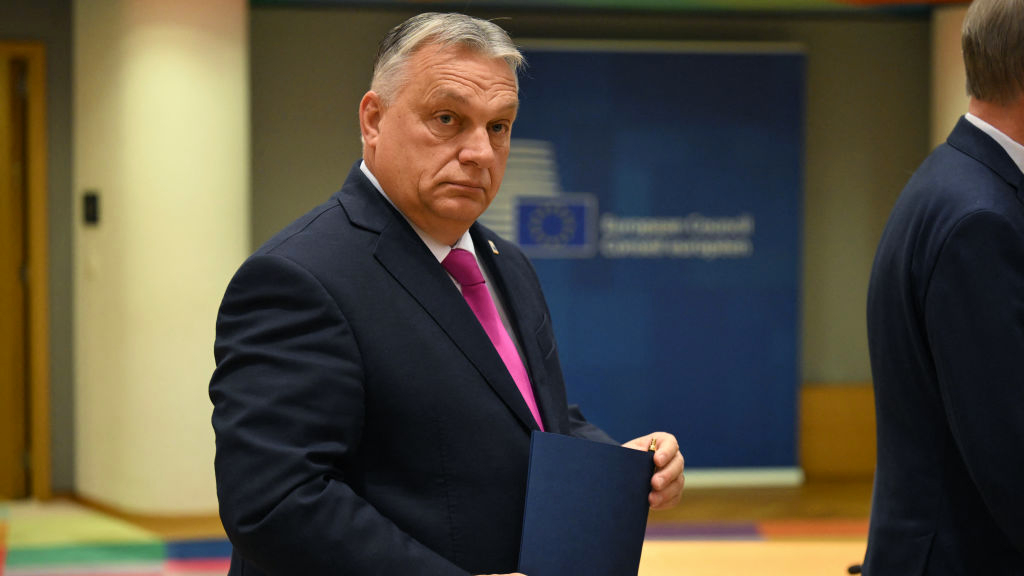EU approves Ukraine membership talks after Hungary's Orbán steps outside for coffee
Orbán blocked $54 billion in European Union aid to Ukraine but surprised everybody by declining to veto Kyiv's accession upgrade


A free daily email with the biggest news stories of the day – and the best features from TheWeek.com
You are now subscribed
Your newsletter sign-up was successful
The European Union agreed Thursday to open accession talks with Ukraine, in a boost to Kyiv and a blow to Russian President Vladimir Putin, but failed to approve 50 billion euros ($54 billion) in aid to Ukraine after Hungarian Prime Minister Viktor Orbán vetoed the money. The EU also approved membership talks for Ukraine's neighbor Moldova and accepted Georgia as a candidate for joining the bloc.
Orbán, Putin's closest ally inside the EU, had threatened to block Ukraine's membership bid from advancing as well. But in a surprise move, he stepped outside the room to allow the other 26 EU leaders to approve Kyiv's upgrade to accession talks unanimously, as required under EU rules. That was German Chancellor Olaf Scholz's idea, Politico reported. "About three hours into deadlocked discussions," Scholz suggested that Orbán "grab a coffee outside the room, perhaps," and the Hungarian leader, already wavering in his opposition, agreed.

Orbán said on social media Thursday night that he had vetoed the funds to Ukraine and still disagreed with "this bad decision" on membership negotiations.
The Week
Escape your echo chamber. Get the facts behind the news, plus analysis from multiple perspectives.

Sign up for The Week's Free Newsletters
From our morning news briefing to a weekly Good News Newsletter, get the best of The Week delivered directly to your inbox.
From our morning news briefing to a weekly Good News Newsletter, get the best of The Week delivered directly to your inbox.
Ukrainian President Volodymyr Zelenskyy — fresh off a disappointing trip to Washington, where Republicans refused to relent on blocking military aid without domestic concessions — celebrated the vote. "This is a victory for Ukraine. A victory for all of Europe. A victory that motivates, inspires and strengthens," he said on X, formerly Twitter. "History is made by those who don't get tired of fighting for freedom."
Ukraine and Moldova applied for EU membership after Russia invaded Ukraine. Putin has reacted poorly to previous efforts by Ukraine to move closer to Europe.
Ukraine is years away from gaining EU membership, and Orbán's advisers suggested he will throw up roadblocks later in the process. European Council President Charles Michel hailed the "historic moment" at an early Friday news conference and said the leaders would reconvene in "early January" to try again on the EU budget and Ukraine aid. If Hungary continues to stand in the way, "we have various tools in our toolbox to ensure that we deliver on our political promises," he added.
Ukraine, which is running low on ammunition and other military tools to continue fighting Russian invaders, "can withstand a small delay in the approval of the funds," The New York Times reports. The Senate still plans to work toward an agreement for aid to Ukraine and Israel, but the House has adjourned for the rest of the year.
A free daily email with the biggest news stories of the day – and the best features from TheWeek.com
Peter has worked as a news and culture writer and editor at The Week since the site's launch in 2008. He covers politics, world affairs, religion and cultural currents. His journalism career began as a copy editor at a financial newswire and has included editorial positions at The New York Times Magazine, Facts on File, and Oregon State University.
-
 ‘Zero trimester’ influencers believe a healthy pregnancy is a choice
‘Zero trimester’ influencers believe a healthy pregnancy is a choiceThe Explainer Is prepping during the preconception period the answer for hopeful couples?
-
 AI surgical tools might be injuring patients
AI surgical tools might be injuring patientsUnder the Radar More than 1,300 AI-assisted medical devices have FDA approval
-
 9 products to jazz up your letters and cards
9 products to jazz up your letters and cardsThe Week Recommends Get the write stuff
-
 Epstein files topple law CEO, roil UK government
Epstein files topple law CEO, roil UK governmentSpeed Read Peter Mandelson, Britain’s former ambassador to the US, is caught up in the scandal
-
 Iran and US prepare to meet after skirmishes
Iran and US prepare to meet after skirmishesSpeed Read The incident comes amid heightened tensions in the Middle East
-
 Grok in the crosshairs as EU launches deepfake porn probe
Grok in the crosshairs as EU launches deepfake porn probeIN THE SPOTLIGHT The European Union has officially begun investigating Elon Musk’s proprietary AI, as regulators zero in on Grok’s porn problem and its impact continent-wide
-
 Israel retrieves final hostage’s body from Gaza
Israel retrieves final hostage’s body from GazaSpeed Read The 24-year-old police officer was killed during the initial Hamas attack
-
 China’s Xi targets top general in growing purge
China’s Xi targets top general in growing purgeSpeed Read Zhang Youxia is being investigated over ‘grave violations’ of the law
-
 Ukraine, US and Russia: do rare trilateral talks mean peace is possible?
Ukraine, US and Russia: do rare trilateral talks mean peace is possible?Rush to meet signals potential agreement but scepticism of Russian motives remain
-
 Panama and Canada are negotiating over a crucial copper mine
Panama and Canada are negotiating over a crucial copper mineIn the Spotlight Panama is set to make a final decision on the mine this summer
-
 The rise of the spymaster: a ‘tectonic shift’ in Ukraine’s politics
The rise of the spymaster: a ‘tectonic shift’ in Ukraine’s politicsIn the Spotlight President Zelenskyy’s new chief of staff, former head of military intelligence Kyrylo Budanov, is widely viewed as a potential successor
